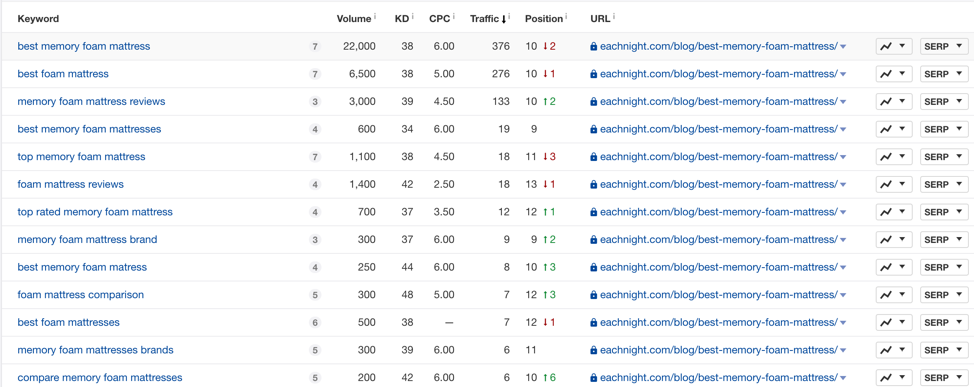Follow Lilach

How to Know Which Keywords Will Work Best for Your Business
When embarking on the creation of your business’ website, there are hundreds of factors to consider.
And while SEO experts will often argue about the most important ranking factor or the most lucrative marketing strategy, I think it’s fairly safe to say that we all agree on the importance of keywords.
You can certainly choose to omit keyword research and keyword optimization as a step in your digital marketing strategy, but doing so will rob you of many chances to rank better, attract a more interested audience, or outrun a competitor.
In an aim to help you embark on the strenuous but rewarding journey of keyword research, let’s explore how you can know which keywords will work best for your business.

How to find keywords
Let’s first go over some basic steps, which are true for any keyword research process:
1. Brainstorm keywords
The first step you should be taking is taking out pen and paper (it can be digital), and writing down all the keywords that are relevant for your business. Don’t think of search engines and online customers at this point. Just think about all the services or products you have, and write down all the keywords that come to mind.
If you have already determined a set of pages you want to create (for example, if you offer five different kinds of services, and want each service to have its own page), you can go from there, and brainstorm keywords per page.
On the other hand, you can also go the other way around, and first write down all the keywords you can think of, and then group them based on similarity, and create a page for them.
Think about the words people might use to describe what you offer, and what they might want to know about your products or services. The more you can think of at this point, the better, as you can later check these ideas against all kinds of keyword research tools.
You don’t have to use all of them, of course – but the more you have to start with, the more you will be able to find later on.
2. Check what others have done in the same space
The next step you should be taking is taking a look at what your competitors are doing.
I use the term competitor loosely here, as this doesn’t necessarily have to be a company that does exactly what you do – it can be a company that has focused on only one of the products or services you yourself offer, or a company that does a lot more than you do, but that does overlap to an extent.
You can execute this step manually, by reading your competitors’ pages, but that will take a long time, and you might easily miss some obvious keywords.
The best way to do this is to use a tool like Ahrefs, Moz, or SEMRush, that will list out all of the keywords a website is ranking for. From there, you can export these lists of keywords, and add the ones you think might work to your own list. More on what will work a little further down.
3. Check what Google ranks well
Once you have settled for a certain set of keywords, make sure you check what Google is already ranking for it: just search for your keyword in Google, and look at the websites that come up.
True, all of the tools listed above will give you their own version of what is ranking at the top for a keyword, but make sure that you also check in the actual search engine.
Add the top-ranking pages to your list of keywords (top five or top ten, depending on how thorough you want to be), and when you start writing a page, make sure you also analyze the top-ranking ones: how long they are, how they are using their keywords, what it is they are saying, and so on. That will help you craft a page that has a better chance to rank well.
4. Check your ideas against a keyword research tool
Finally, you should always rely on a keyword research tool for choosing your keywords. Your own ideas are a great place to start, but you will need a lot of data to make the right decision.
Moz, Ahrefs, and SEMRush all work well. You can also use Keyword Planner if you have spent some money on pay-per-click advertising, but there are tools out there like Ubersuggest that can also give you plenty of ideas.
I personally use Ahrefs, so I will be using terms from that tool, but all of them have somewhat similar terms and work in similar ways.
The data you want to be looking at is the following:
- Keyword difficulty
- Search volume
- Top-ranking pages for a keyword
- The backlinks of the top-ranking keyword
Keyword difficulty is Ahrefs’s way of telling you how hard it will be to rank for a certain keyword. The lower the number, the easier the task ahead.
Search volume denotes how many people look for said keyword in a month – bear in mind that this is not always precise, and that you can get a lot more traffic than predicted. You want to be targeting keywords that have a decent search volume – I’d say anything above 100, to begin with.
The top-ranking pages for a keyword are important because you don’t want to take on a keyword that has Forbes, the New York Times, and Medium competing for the top spot – you just won’t be able to outrank them.
The backlinks of these pages will tell you how many links you need to build to rank well – the fewer links these top-ranking pages have, the easier it will be for you to overtake them.
In a nutshell, you are aiming for keywords that have a decent amount of monthly traffic, but that have low competition (notably in terms of backlinks).
It will take some time to find them – but if you are persistent, and if you also factor in the tips I am about to delve into below, you should have no problem finding keywords that will work for your business.
How to find keywords that work

Now that we have covered the basics, let’s talk about some more specific facts that you should also keep in mind:
Blog pages vs. service pages
You always need to distinguish between your blog pages and your service pages.
There won’t be much wiggle room when it comes to service or product pages: you can’t (and should not try to!) work in keywords that make absolutely no sense. Use every keyword variation you think you need and that works on a page, but always remember that these keywords will most often be much more competitive than the keywords you use on your blog.
This is where your true chance to rank well comes in.
Focus on uncovering keywords that have high search volumes but very low competition (few or no backlinks, outdated content, etc.). These will most often be long-tail variations of a certain keyword.
Write a blog post centering around this keyword, and aim to rank it at the very top (this means you will need to build links to it). Make sure you link to your product or service page from this top-ranking post, so as to pass down SEO value.
Of course, you shouldn’t neglect keyword research for your product or service pages – you might find some in your own niche that you can rank for well.
You will rank for a lot of keywords
A very important fact you need to keep in mind: you will never rank for one keyword alone. In fact, modern SEO is no longer about overstuffing a page with a single keyword in order to rank for it.
Every page will naturally and automatically rank for more than one keyword, even if you never mention some of them in your writing. That’s just the way search engines work – they are getting much smarter, and the best way to optimize a page for a certain set of keywords is to write an in-depth article about the topic at hand.
Here’s an example from Ahrefs:

This page is ranking for 502 keywords, even though it certainly does not mention all 502 of them. It is, however, well written, and is therefore considered a valuable resource by search engines for all sorts of similar queries that use different words to describe what this page is about.
The combined effort of more than one keyword
Another very important fact to bear in mind, in connection with the one we have just listed above, is that you can easily combine several different keywords on one page when looking for the best keywords.
Let me give you another Ahrefs example:

Here is a page that ranks towards the bottom of page one of Google for a variety of similar keywords. Even though the page isn’t ranking in one of the top 3 spots for any of the major keywords it likely gets quite a bit of monthly traffic (Ahrefs estimates over 1,000/month). That’s because the page ranks well for so many longtail variations of the main keyword.
When writing your pages, make sure you don’t dismiss a keyword just because it has low search volume – try to look for similar keywords (most keyword research tools will give you an option to do that), and calculate their combined value, rather than looking at each one of them individually.
You can also take a look at the keywords a top-ranking page similar to the one you want to write is ranking for, and consider their combined volume and potential traffic.
Don’t forget about search intent
Search intent is a very powerful aspect of SEO – but it can be difficult to determine.
For example, when someone types “SEO” into a search engine, you don’t really know what they need – do they want to hire an SEO agency, are they looking to learn more about the term, etc.
However, when someone is looking for “red sneakers under $50,” chances are they are looking to shop.
Make sure you factor in search intent when crafting your pages. If you want to rank well for a long tail keyword (and these are usually the best ones to gauge search intent), make sure you have taken into consideration what the person is looking for: a guide, a comparison, a recommendation, a service. That way, you can preempt their next step, and offer exactly what they are searching for.
Work on your local presence
Don’t forget that you also need to rank for local keywords, even if you are working globally. This will help you stand out in your community and allow local people to find you.
You will need to do some local keyword research, and you might even uncover that certain high-traffic and high-value keywords that are taken globally have some very low local competition, one which you can easily beat.
In order to boost your local SEO, make sure you also get cited in local directories, that you build some local links, and that you use local anchor text when linking to your website.
Don’t forget your brand name
Finally, don’t forget that you also need to rank well for your brand name, and that it will also most likely appear in all kinds of variations.
One more example from Ahrefs:

This page is ranking at the very top for all kinds of variations of their brand name, and most of them have a very decent amount of traffic.
This doesn’t mean you should use different variations for your brand across your pages – uniformity always works best, but you should bear in mind that you will rank for variations, and remember to build some branded links to your pages.
You can also do some unlinked mentions research and acquire some branded links that way, which will boost your rankings for your brand name.
Final thoughts

To recap: the best way to find keywords that will work for your business is to start from specialized keywords and work from there. Look for keywords that are related to your business, that you can provide value for, and remember to consider search intent when writing a page.
As you build up your relevance, you will be able to tackle more difficult keywords as well. But for starters, go for something with as high a search volume as you can get, but that has a competition you can beat without too much effort.
About the author:
Natasha is a lady of a keyboard and one hell of a geek. She is always happy to collaborate with awesome blogs and share her knowledge about design, branding, digital marketing trends and business growth strategies. To see what she is up to next, check out her Twitter Dashboard.

Follow Lilach















